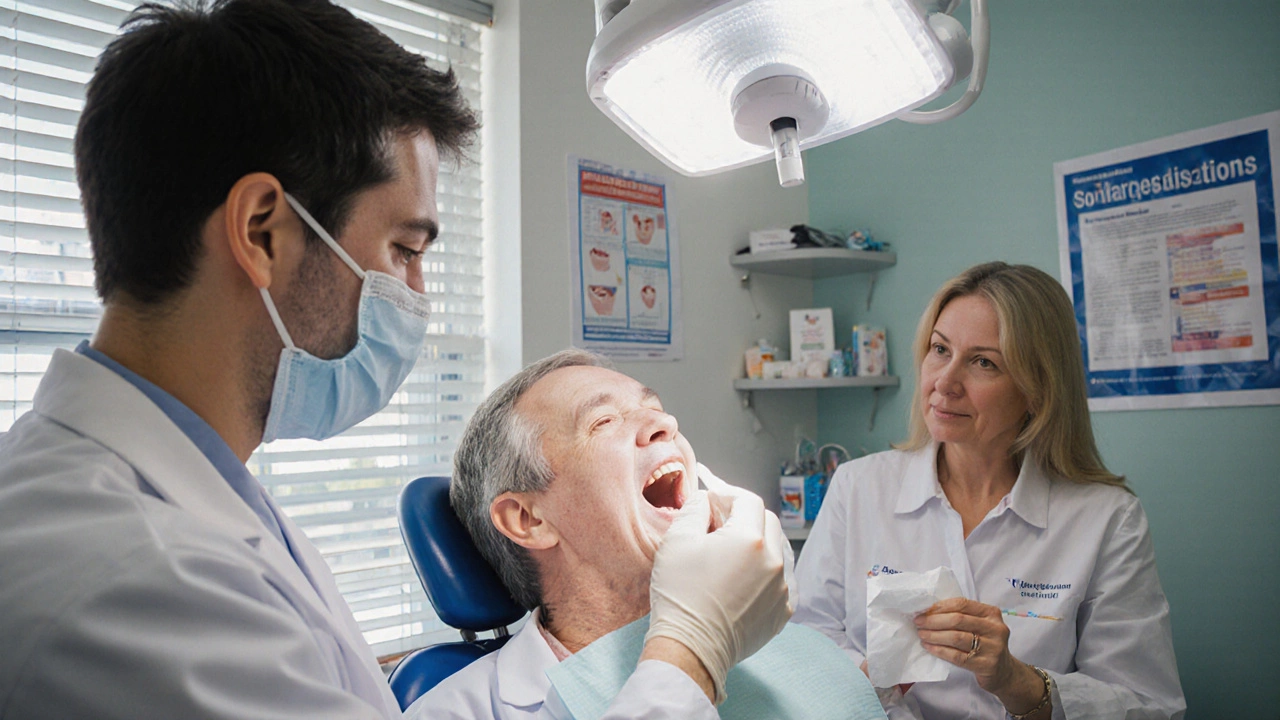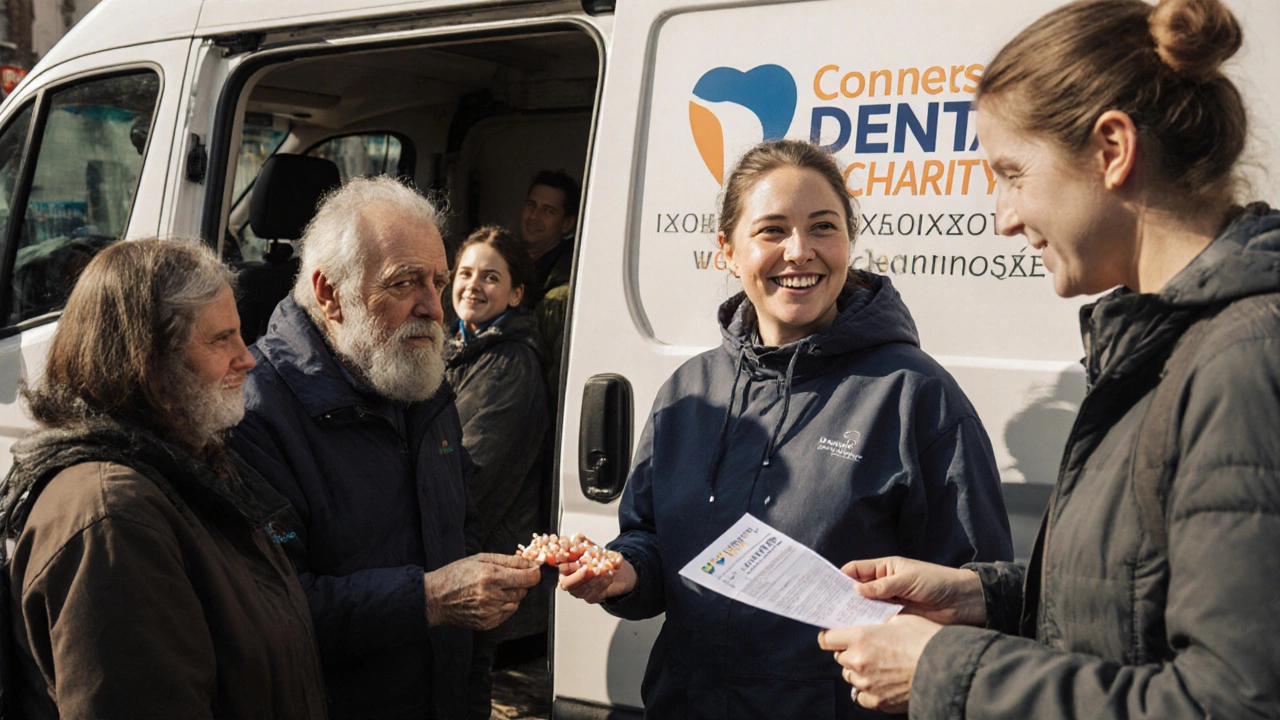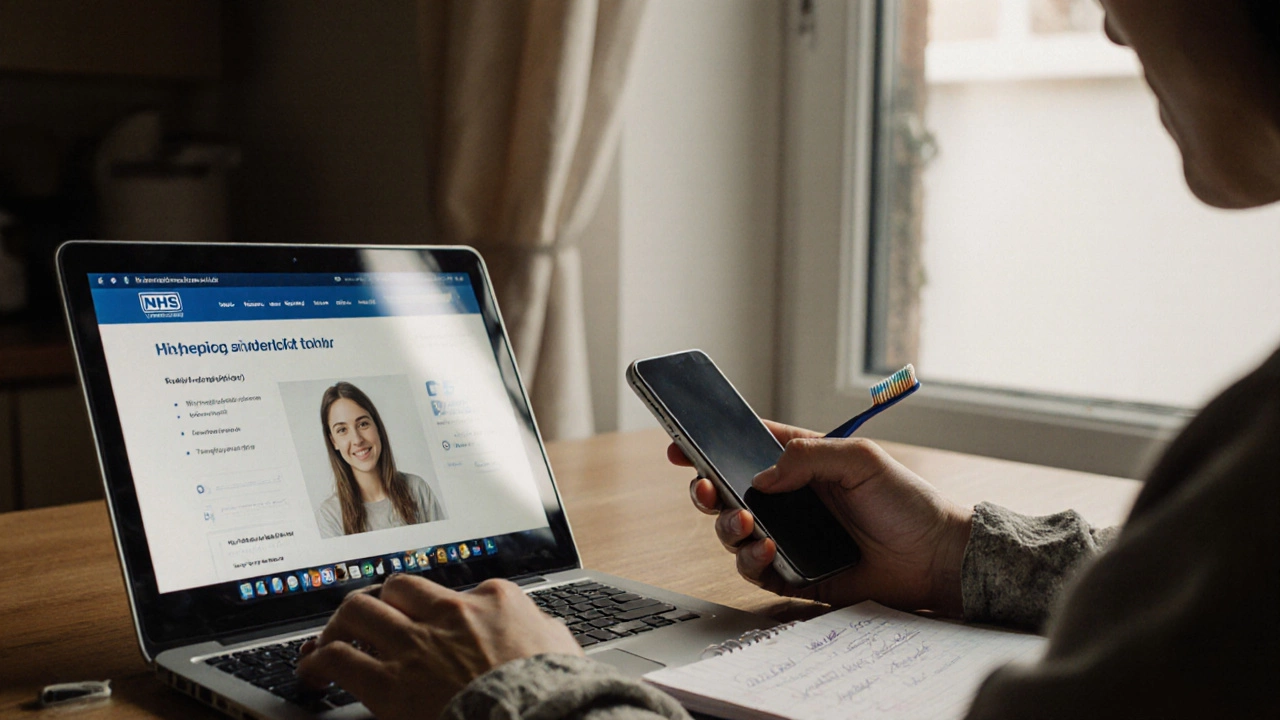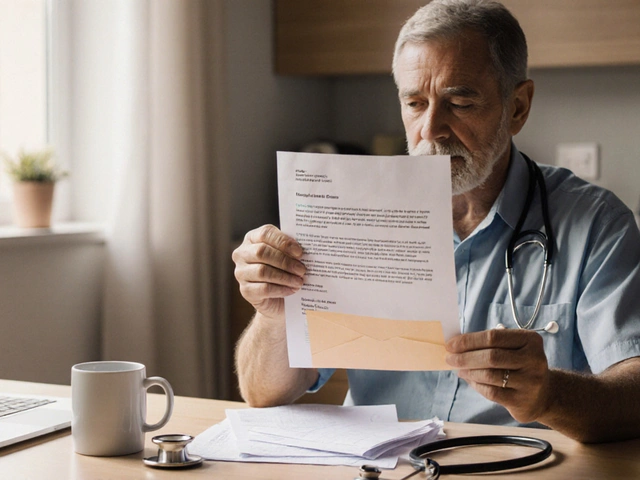NHS Dental Cost Calculator
Select treatments above to see comparison
Emergency care is free if you're in pain
Call 111 immediately for toothaches, infections, or swelling.
This is your first step to getting pain relief and preventing serious complications.
If your teeth are falling apart and you have no money, you’re not alone. Thousands of people in the UK struggle with painful, broken, or missing teeth because they can’t afford private care. But here’s the truth: you don’t need to live with pain or hide your smile. There are real, legal ways to get your teeth fixed-even if you’re on zero income.
NHS Dental Treatment Is Your First Lifeline
The NHS doesn’t just cover doctor visits-it covers dental care too. If you’re on certain benefits like Income Support, Universal Credit, or Pension Credit, you’re entitled to free NHS dental treatment. Even if you’re not on benefits, you might still qualify for reduced costs. The NHS dental charges are fixed: Band 1 costs £26.80 (covers check-up, diagnosis, and basic treatment), Band 2 is £73.50 (fillings, root canals, extractions), and Band 3 is £319.10 (crowns, dentures, bridges). That’s a lot less than £2,000 for a single implant in private clinics.
Many people think NHS dentists don’t exist anymore, but they do. The problem is availability. To find one, go to the NHS website and use the dentist finder. Filter by "Accepts new NHS patients." Call every one on the list. Don’t give up after one or two rejections. Some practices only take a few new NHS patients each month. Keep calling until you get through.
Emergency Dental Care Is Free If You’re in Pain
If you have a toothache so bad you can’t sleep, a broken tooth with bleeding, or an abscess swelling your face-you qualify for emergency NHS dental care. You don’t need to be registered with a dentist. Just call 111 and ask for the NHS dental helpline. They’ll connect you to an urgent care service near you. They’ll drain an abscess, pull a rotten tooth, or give you antibiotics to stop the infection. It’s not a full repair, but it stops the pain and prevents sepsis.
Emergency care is your bridge. Once the infection is gone, you can plan your next steps. Many people think emergency care is just a band-aid, but it’s actually the first step in getting your mouth fixed properly. Without it, you risk losing more teeth.
Free Dental Schools Offer Real Treatment
Here’s a secret: dental schools in the UK train students by treating real patients-for free or at very low cost. Students work under the supervision of qualified dentists. You get high-quality care, often with longer appointment times, and you’re not charged for the privilege.
Top schools offering public clinics include:
- King’s College London Dental Institute
- University of Manchester Dental School
- University of Birmingham School of Dentistry
- Queen Mary University of London
- University of Dundee Dental School
Call them directly. Ask if they have a public clinic open to adults. Some only take children, so be specific. You might wait a few weeks for an appointment, but it’s worth it. You can get fillings, root canals, extractions, and even dentures for free. A few schools even offer limited implant placement training for patients who meet criteria.

Dentures Are a Real Alternative to Implants
If you’ve lost multiple teeth, you might think implants are your only option. They’re not. Dentures-especially NHS-funded ones-are a fast, affordable, and effective solution. An NHS full denture costs £319.10. That’s less than one private implant. Modern dentures are lightweight, natural-looking, and fit better than the ones your grandparents wore.
Some people avoid dentures because they’re embarrassed. But thousands of people wear them. They eat, speak, and smile confidently. If you’re worried about how they look, ask your NHS dentist for a cosmetic denture. They can match the color and shape to your original teeth. You don’t need to look like you’re wearing a fake smile.
Charities and Grants Can Help With Costs
There are charities that help people who can’t afford dental care. They don’t advertise widely, but they exist.
- Dental Action Alliance - Offers vouchers for free treatment at participating practices across the UK.
- The Oral Health Foundation - Can refer you to free or low-cost clinics and sometimes help with transport costs.
- Local councils and community groups - Many run dental outreach programs for homeless people, low-income families, or elderly residents.
Search online for "free dental care [your city]" or call your local council’s social services department. Ask if they have a dental support program. Don’t assume you don’t qualify-many programs have no income limits.

Payment Plans and Dental Discount Schemes
If you can scrape together a little money each month, you don’t need to wait for free care. Many private dentists offer payment plans. You pay £20-£50 a month for up to two years to cover a full course of treatment. No credit check. No interest. Just a direct debit.
Some dental practices also belong to discount schemes like Dental Care Plus or Denplan. For £10-£15 a month, you get check-ups, cleanings, X-rays, and discounts on fillings or extractions. It’s not free, but it’s far cheaper than paying upfront.
Ask any private dentist you call: "Do you offer payment plans?" If they say no, ask for another practice. This is common now. Dentists want patients to get treated-not avoid care because they can’t pay.
What NOT to Do
Don’t pull your own teeth. Don’t use DIY kits from Amazon. Don’t wait until you can’t eat or speak. Don’t believe the myth that "no one can help you if you have no money." That’s false. The system is slow, frustrating, and underfunded-but it still works.
Don’t go to A&E for tooth pain unless you’re swollen, feverish, or having trouble breathing. Emergency rooms don’t pull teeth. They’ll give you painkillers and send you to a dentist anyway.
Don’t let shame stop you. People don’t judge you for needing help. They judge you for suffering in silence.
What Comes Next
Start today. Write down your three next steps:
- Call 111 for emergency care if you’re in pain.
- Go to the NHS dentist finder and call five practices.
- Search for "free dental clinic [your town]" and email one dental school.
You don’t need money to fix your teeth. You need to take action. The system won’t come to you. You have to reach out. But once you do, help is waiting.
Can I get free dental implants on the NHS?
The NHS rarely funds dental implants. They’re considered cosmetic unless you’ve lost teeth due to cancer, trauma, or severe congenital conditions. For most people, NHS dentures are the standard replacement. Implants are expensive and require healthy bone and gums-conditions that often need treatment first. Focus on getting your mouth stable with extractions or dentures, then explore private options later if you can save up.
What if I’m not on benefits but still can’t afford dental care?
You still qualify for reduced NHS fees. Ask your dentist for an HC2 form. It’s free to apply, and you can get it from Jobcentre Plus or online. Even if you earn a little, you might still get free or low-cost treatment. Many people don’t apply because they assume they earn too much-but the rules are more flexible than you think.
How long do I wait for an NHS dentist appointment?
It varies. In some areas, you might wait weeks. In others, months. But emergency care is always available. If you’re in pain, call 111. For routine care, keep calling different practices. One will open a spot. Some clinics reserve slots for new NHS patients every Monday. Call early. Be persistent.
Can I get dental treatment if I’m homeless?
Yes. Many NHS dental practices and charities specifically serve homeless people. Contact your local council’s housing or outreach team. They can refer you to mobile dental units or clinics that don’t require proof of address. Organizations like St Mungo’s and The Salvation Army also help connect people to dental care.
Are there any scams I should watch out for?
Yes. Watch out for ads promising "free implants" or "£99 smile makeovers." These are often traps. They charge you later for X-rays, anesthesia, or "essential" add-ons. Stick to NHS services or registered dental schools. If a clinic asks for full payment upfront without a treatment plan, walk away. Real providers give you a written quote before you pay anything.




